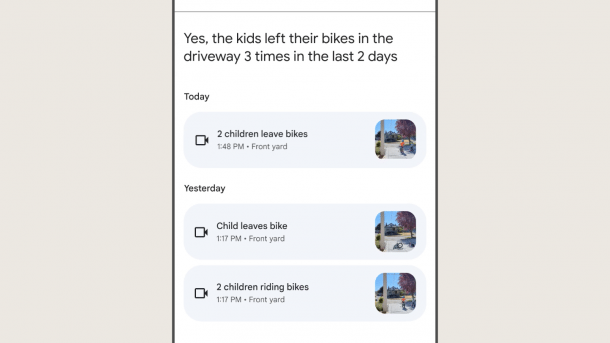Google's Gemini moves into the smart home: Assistant, Nest and Home
Google's Nest cameras, Google Home and the Google Assistant are set to become smarter and more useful thanks to the Gemini AI model.

The camera recordings can be searched in future.
(Image: Google Blogbeitrag)
Artificial intelligence is now also making its way into Google's smart home products. The Gemini large voice model is designed to make the Google Assistant, Home and Nest cameras smarter and more useful, writes Google. This is mainly thanks to natural language.
The Nest cameras already have a function for facial recognition and for recognizing certain movements and packages, for example, which are of course based on artificial intelligence. Gemini complements these capabilities as a multimodal AI model that can process videos, images and text. This should enable the cameras to develop a better understanding of what is happening in your home. Google gives the example in the blog post that the system then no longer just recognizes an "animal", but specifically "dog digging in the garden".
Videos by heise
Another new feature is a search function for the camera. This means you can search the recordings for specific activities. So if you want to know how the dog managed to dig up a treasure, you can potentially search for the dog and the treasure without having to look at hours of footage. Of course, Google emphasizes that all data remains secure and private.
Google Home makes it possible to create numerous automations. Gemini should make this easier. This is because the voice model makes it possible to create automations using natural language. This can be done via the Google Home app by entering: "Create for me". Google also has an example here: "Close the doors and turn off all the lights at bedtime".
New voices and better conversations with the Assistant
Google has also announced new features for the Google Assistant based on Gemini. However, these will not be released until later in the year. These include a new selection of voices that should feel more natural. Thanks to the large voice model, the entire communication with the Assistant should then improve - it should also become more natural and you can also ask follow-up questions, i.e. start a conversation.
Google envisions that the Assistant will also be able to help with brainstorming or contribute ideas and arguments.
(emw)